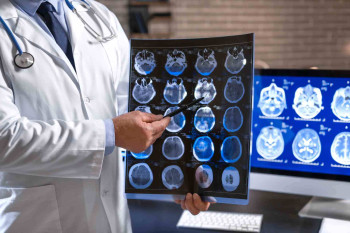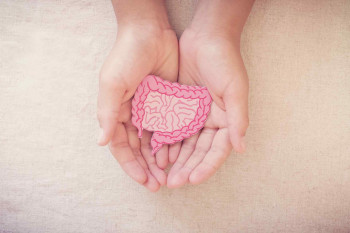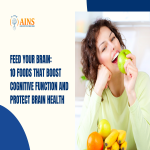The A-Z’s of Headache Types: Understanding, Diagnosing, and Treating with Dr. Vikas Bhardwaj at AINS Noida
Introduction:
Headaches are a common neurological condition that can significantly impact daily life and well-being. If you're someone who suffers from headaches, it's important to understand the different types of headaches, their causes, symptoms, and treatment options.
In this blog, we will explore the A-Z's of headache types, with a focus on the expertise of Dr. Vikas Bhardwaj, a renowned neurologist at AINs (Apex Institute of Neuro Spine) in Noida, a trusted institute for neuro-spine care.
Dr. Vikas Bhardwaj: An Expert in Neurology at AINS Noida:
Dr. Vikas Bhardwaj is a highly qualified and experienced neurologist at AINs Noida. He holds advanced degrees in neurology and has extensive expertise in diagnosing and treating neurological conditions, including headaches. With years of experience and a patient-centric approach, Dr. Bhardwaj has earned a reputation as a trusted neurologist in the field of neuro-spine care.
Understanding Headaches: A Common Neurological Condition:
Headaches are a prevalent neurological condition characterized by pain or discomfort in the head or neck region. They can be caused by various factors, including stress, tension, hormonal changes, environmental factors, and medical conditions.
Headaches can be classified into different types, and understanding their causes, symptoms, and treatment options is crucial for effective management.
Types of Headaches:
There are several types of headaches, each with its own distinct characteristics. Here's a closer look at some common types of headaches:
Rebound Headaches:
Symptoms:
Frequent, daily headaches that occur in individuals who overuse medication for headache relief.
Typically, the pain is mild to moderate and is often described as dull or pressing.
Can be associated with other withdrawal symptoms from medication overuse, such as restlessness, irritability, and difficulty sleeping.
Causes:
Overuse of medications such as analgesics, triptans, or ergotamines, used for headache relief, leading to a rebound effect.
Medication overuse disrupts the normal pain control mechanisms in the brain, leading to increased headache frequency and intensity.
Diagnosis:
Based on the history of medication overuse and frequent headaches.
Evaluation of medication usage patterns and discontinuation of overused medications to confirm rebound headache.
Treatment:
Discontinuation of overused medications under the guidance of a healthcare professional.
Transitioning to alternative headache management strategies, such as lifestyle changes, preventive medications, or non-medication approaches.
Close monitoring and follow-up with a healthcare professional for management and prevention of rebound headaches.
Hormonal Headaches:
Symptoms:
Headaches that are triggered or worsened by hormonal fluctuations during menstrual cycles, pregnancy, or menopause.
Can be accompanied by other symptoms such as mood changes, fatigue, breast tenderness, and bloating.
Typically, occur in a cyclic pattern with the hormonal changes.
Causes:
Hormonal fluctuations during menstrual cycles, pregnancy, or menopause affecting blood vessels, neurotransmitters, and pain perception pathways in the brain.
Genetics, hormonal imbalances, and other factors may also contribute.
Diagnosis:
Based on the history of headaches related to hormonal fluctuations.
Keeping a headache diary to track headache patterns in relation to hormonal changes.
Evaluation of hormonal levels and other potential underlying causes by a healthcare professional.
Treatment:
Hormonal management approaches such as hormonal contraceptives, hormone replacement therapy, or other hormonal medications under the guidance of a healthcare professional.
Lifestyle changes, stress management, and other non-medication approaches may also be helpful.
Symptomatic relief with over-the-counter pain medications or prescribed medications as recommended by a healthcare professional.
Sinus Headaches:
Symptoms:
Pain and pressure in the face, usually around the eyes, cheeks, or forehead.
Accompanied by other symptoms of sinusitis, such as nasal congestion, postnasal drip, or thick nasal discharge.
Symptoms often worsen with changes in weather, bending forward, or lying down.
Causes:
Inflammation or infection of the sinuses, often due to viral or bacterial infections.
Blocked sinuses leading to increased pressure and pain.
Diagnosis:
Based on the symptoms, history of sinusitis, and physical examination.
Imaging studies may be ordered in some cases to evaluate the sinuses.
Treatment:
Management of underlying sinusitis with appropriate medications as prescribed by a healthcare professional, including antibiotics if bacterial infection is present.
Symptomatic relief with over-the-counter pain medications, decongestants, or nasal saline rinses.
Warm compresses and steam inhalation may also provide relief.
Cluster Headaches:
Symptoms:
Severe, excruciating pain that is usually localized around one eye or temple.
Occur in clusters or patterns, with episodes of frequent attacks lasting weeks to months followed by periods of remission.
Can be accompanied by other symptoms such as nasal congestion, tearing, or restlessness.
Often described as one of the most severe forms of headache.
Causes:
The exact cause is unknown, but it is believed that cluster headaches may be related to abnormalities in the hypothalamus, a part of the brain that plays a role in regulating sleep, mood, and other functions.
Triggers such as alcohol, certain foods, high altitude, and changes in sleep patterns may also be associated with cluster headaches.
Diagnosis:
Based on the characteristic symptoms and pattern of attacks.
A thorough medical history and physical examination.
Imaging studies such as MRI or CT scan may be ordered to rule out other underlying conditions.
Treatment:
Acute treatment with medications such as triptans, oxygen therapy, or other prescribed medications to relieve pain during an attack.
Preventive treatment with medications such as verapamil, corticosteroids, or other prescribed medications to reduce the frequency and severity of cluster headaches.
Lifestyle changes, stress management, and avoiding triggers may also be helpful.
Migraine Headaches:
Symptoms:
Moderate to severe headache pain that is usually pulsating or throbbing in nature and often affects one side of the head.
Accompanied by other symptoms such as nausea, vomiting, sensitivity to light, and/or sound.
Can be triggered by various factors such as stress, certain foods, hormonal changes, weather changes, or lack of sleep.
Migraine attacks can last for hours to days and can significantly impact daily activities.
Causes:
The exact cause of migraines is not fully understood, but it is believed to involve complex interactions between genetic, environmental, and neurological factors.
Imbalances in brain chemicals, changes in blood flow to the brain, and other factors may also play a role.
Diagnosis:
Based on the characteristic symptoms and pattern of migraine attacks.
A thorough medical history and physical examination.
Keeping a migraine diary to track triggers, frequency, and severity of attacks.
Treatment:
Acute treatment with medications such as triptans, nonsteroidal anti-inflammatory drugs (NSAIDs), antiemetics, or other prescribed medications to relieve pain and other symptoms during a migraine attack.
Preventive treatment with medications such as beta-blockers, antidepressants, anticonvulsants, or other prescribed medications to reduce the frequency and severity of migraine attacks.
Lifestyle changes, stress management, identifying and avoiding triggers, and other non-medication approaches may also be helpful.
Tension Headaches:
Symptoms:
Mild to moderate headache pain that is usually described as a constant band-like pressure or tightness around the head.
Tenderness or discomfort in the neck, shoulders, or scalp may also be present.
No nausea, vomiting, or other significant associated symptoms.
Tension headaches can last for hours to days and are often triggered or worsened by stress or tension.
Causes:
Exact causes are not well understood, but tension headaches are believed to involve a combination of genetic, environmental, and psychological factors.
Muscle tension or stress leading to increased muscle tension in the head, neck, and shoulders may also play a role.
Diagnosis:
Based on the characteristic symptoms and absence of other significant associated symptoms.
A thorough medical history and physical examination.
Keeping a headache diary to track triggers, frequency, and severity of tension headaches.
Treatment:
Acute treatment with over-the-counter pain medications such as acetaminophen, NSAIDs, or other prescribed medications to relieve pain during a tension headache.
Lifestyle changes, stress management, relaxation techniques, physical therapy, and other non-medication approaches may also be helpful.
Preventive treatment with medications such as tricyclic antidepressants, muscle relaxants, or other prescribed medications may be considered in cases of frequent or chronic tension headaches.
Exertional Headache:
Symptoms:
Throbbing or pulsating pain.
Triggered by physical exertion or strenuous activities.
Typically lasts for a short duration.
May be accompanied by nausea or other symptoms of migraine.
Causes:
Increased blood flow to the brain during physical activity leading to dilation of blood vessels in the brain.
Dehydration or electrolyte imbalance during exercise.
Diagnosis:
Based on a thorough medical history and physical examination.
Imaging studies such as MRI or CT scan may be ordered to rule out underlying causes.
Treatment:
Rest and hydration.
Avoidance of triggers.
Over-the-counter pain medications such as acetaminophen or ibuprofen.
In some cases, preventive medications may be prescribed by a healthcare professional.
Hypertension Headache:
Symptoms:
Dull, persistent headache.
May be accompanied by other symptoms of high blood pressure, such as dizziness, blurred vision, or nosebleeds.
Causes:
High blood pressure or hypertension, which puts increased pressure on blood vessels in the brain.
Lifestyle factors such as stress, unhealthy diet, lack of physical activity, and other underlying health conditions.
Diagnosis:
Measurement of blood pressure levels.
A thorough medical history and physical examination.
Other tests may be ordered to determine the underlying cause of hypertension.
Treatment:
Lifestyle changes, including a healthy diet, regular exercise, stress management techniques, and medications as prescribed by a healthcare professional.
Management of any underlying health conditions contributing to hypertension.
Post-Traumatic Headache:
Symptoms:
Develops after a head injury or trauma, such as a concussion.
May be accompanied by other symptoms such as dizziness, memory problems, mood changes, and sensitivity to light and sound.
Can last for varying durations depending on the severity of the head injury.
Causes:
Head trauma, such as a concussion or other head injuries from accidents, sports-related injuries, or falls.
Alteration in brain chemistry and function following a head injury.
Diagnosis:
Medical history and physical examination.
Imaging studies such as MRI or CT scan may be ordered to evaluate the extent of the head injury.
Treatment:
Rest and avoidance of triggers.
Pain management with over-the-counter medications or as prescribed by a healthcare professional.
In some cases, specialized treatments may be recommended based on the severity of the head injury, such as physical therapy, cognitive behavioral therapy, or other interventions.
Medication Overuse Headache:
Symptoms:
Chronic and frequent headaches.
Results from overuse of pain-relief medications, including over-the-counter or prescription medications, for treating headaches.
Can result in a cycle of headaches where medication overuse leads to more frequent headaches.
Causes:
Excessive use of medications, including analgesics, triptans, or opioids, to treat headaches.
Lack of awareness about the risks of medication overuse and dependence.
Diagnosis:
Medical history and physical examination.
Evaluation of the frequency and type of medications used for headache relief.
Treatment:
Withdrawal from the overused medications under the guidance of a healthcare professional.
Development of a personalized treatment plan for managing headaches, which may include lifestyle changes, preventive medications, and other interventions.
Education about the risks of medication overuse and strategies for avoiding it in the future.
Ice Cream Headache:
Symptoms:
Brief, sharp headache.
Occurs after consuming cold foods or beverages, such as ice cream or frozen drinks
Causes:
Rapid temperature changes in the mouth caused by cold foods or beverages leading to the constriction and dilation of blood vessels in the brain.
Nerve response triggered by the cold stimulus.
Diagnosis:
Based on the symptoms and history of consuming cold foods or beverages.
Typically, no specific diagnostic tests are required.
Treatment:
Usually self-limited and resolves on its own without any specific treatment.
Slowly consuming cold foods or beverages to minimize the temperature changes in the mouth.
Avoiding rapid consumption of very cold foods or beverages.
Thunderclap Headache:
Symptoms:
Sudden and severe headache that reaches its peak intensity within seconds to minutes.
Described as the worst headache of one's life.
Can be accompanied by other symptoms such as nausea, vomiting, altered consciousness, or neck stiffness.
Requires immediate medical attention as it can indicate a serious underlying condition.
Causes:
Can result from various causes, including subarachnoid hemorrhage (bleeding in the space between the brain and its covering), ruptured aneurysm (weakened blood vessel in the brain), or other conditions that cause sudden intense headache.
Diagnosis:
Urgent medical evaluation, including a thorough history, physical examination, and imaging studies such as CT scan or MRI.
Evaluation for potential underlying causes of thunderclap headache.
Treatment:
Immediate medical attention is required, and the treatment depends on the underlying cause.
Management of the underlying condition, which may involve surgical intervention, medication, or other appropriate measures.
Allergy or Sinus Headache:
Symptoms:
Pain and pressure in the front of the face or around the eyes.
Accompanied by other symptoms of sinusitis, such as nasal congestion, runny nose, facial tenderness, or postnasal drip.
Often worsens with changes in weather or exposure to allergens.
Causes:
Inflammation of the sinuses due to allergies or sinusitis.
Increased pressure in the sinuses leading to headache.
Diagnosis:
Based on the symptoms, history of allergies or sinusitis, and physical examination.
Imaging studies may be ordered in some cases to evaluate the sinuses.
Treatment:
Management of underlying allergies or sinusitis with appropriate medications as prescribed by a healthcare professional.
Symptomatic relief with over-the-counter pain medications, decongestants, or nasal saline rinses.
Avoidance of triggers and lifestyle changes, such as staying hydrated and using a humidifier, may also help.
Hangover Headache:
Symptoms:
Occurs after the consumption of alcohol in excess.
Typically characterized by a throbbing headache, nausea, sensitivity to light and sound, and dehydration.
Usually resolves on its own within 24-48 hours.
Causes:
Alcohol consumption leading to dehydration, dilation of blood vessels, and inflammation in the brain.
Accumulation of acetaldehyde, a toxic byproduct of alcohol metabolism.
Diagnosis:
Based on the history of alcohol consumption and associated symptoms.
Typically, no specific diagnostic tests are required.
Treatment:
Rest and rehydration with water, electrolyte-rich fluids, and healthy foods.
Over-the-counter pain medications for symptom relief, as recommended by a healthcare professional.
Prevention by drinking alcohol in moderation, staying hydrated, and eating before drinking.
Diagnosing and Treating Headaches:
Diagnosing the exact type of headache can be complex and may require a thorough evaluation by a neurologist like Dr. Vikas Bhardwaj at AINS Noida.
The diagnosis typically involves a detailed medical history, physical examination, and may require additional tests such as imaging studies, blood tests, and keeping a headache diary to track patterns and triggers.
Once the type of headache is identified, appropriate treatment strategies can be implemented. Treatment options may include medications for pain relief, preventive medications, lifestyle changes, stress management techniques, relaxation exercises, avoiding triggers, and addressing any underlying causes.
Dr. Vikas Bhardwaj at AINS Noida can provide personalized and comprehensive treatment plans tailored to each patient's specific needs.
Conclusion:
Headaches are a common neurological condition that can significantly impact daily life. Understanding the different types of headaches, their causes, symptoms, and treatment options is crucial for effective management. With the expertise of Dr. Vikas Bhardwaj at AINs Noida, a trusted institute for neuro-spine care, patients can receive personalized and comprehensive care for their headache concerns.
If you suffer from headaches, it's important to seek medical evaluation and treatment from a qualified neurologist for accurate diagnosis and appropriate management.

























